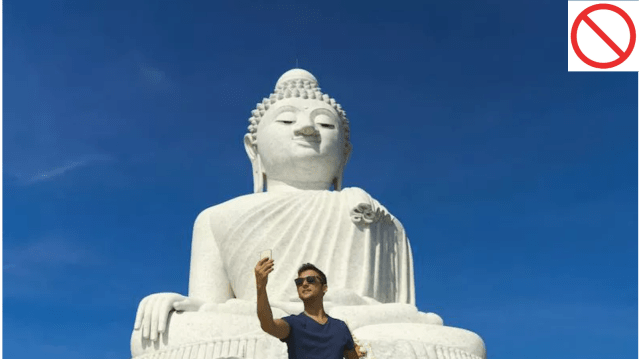📣 For more lifestyle news, click here to join our WhatsApp Channel and also follow us on Instagram
9 bizarre laws around the world for tourists
These laws, shaped by culture, history, and local priorities, might seem unusual, funny, or even a little shocking
 Selfies with Buddha are banned in Sri Lanka (Photo: Facebook/Games of Law)
Selfies with Buddha are banned in Sri Lanka (Photo: Facebook/Games of Law)When you travel, you are expected to follow the local rules. Many of these rules come from a country’s culture and history, which might seem odd or surprising to visitors. Some can even catch you off guard. Whether you think they’re funny or just unusual, these laws show that knowing local customs is as important as remembering your passport. Here are 9 of the strangest laws travellers should know before they arrive.
1. No chewing gum in Singapore
 Representational image (Photo: Freepik)
Representational image (Photo: Freepik)
Chewing gum has been restricted in Singapore since 1992 to maintain clean public spaces. Bringing gum into the country (except for medical or dental purposes) can result in fines.
2. Don’t wear high heels at ancient sites in Greece
 Representational image (Photo: Freepik)
Representational image (Photo: Freepik)
Greece doesn’t ban high heels everywhere, but you can’t wear them at archaeological sites like the Acropolis. This rule helps protect ancient stone structures and keeps visitors safe.
3. No feeding pigeons in Venice, Italy
 Representational image (Photo: Freepik)
Representational image (Photo: Freepik)
Feeding pigeons used to be popular with tourists in Venice, but the city banned it to prevent damage and keep places like Piazza San Marco clean. Many locals even say that “pigeons are disgusting and dirty.”
4. It’s illegal to run out of gas on the Autobahn in Germany
 Representational image (Photo: Freepik)
Representational image (Photo: Freepik)
Drivers in Germany are expected to always stay in control, so running out of gas is seen as something you can avoid. If you stop on the Autobahn without a good reason, you could get fined. Parking on the Autobahn with an empty tank is also not allowed.
5. No selfies with Buddha in Sri Lanka
 Representational image (Photo: Freepik)
Representational image (Photo: Freepik)
In Sri Lanka, turning your back on Buddha for a photo is seen as disrespectful. Taking selfies like this can even lead to arrest or deportation. The law says mistreating Buddhist images and artefacts is not allowed.
6. Don’t flush after 10 pm in Switzerland (in some apartments)
 Representational image (Photo: Freepik)
Representational image (Photo: Freepik)
In some Swiss apartment buildings, quiet-hour rules mean you can’t flush the toilet late at night. It’s seen as noise pollution, which is something people in Switzerland really dislike. While it’s not an official law, many older buildings still follow this rule.
7. No wearing camouflage in many Caribbean countries
 Representational image (Photo: Freepik)
Representational image (Photo: Freepik)
In countries like Barbados, Jamaica, and St. Lucia, civilians aren’t allowed to wear camouflage prints. This rule helps prevent people from being mistaken for military personnel.
8. Don’t step on currency in Thailand
 Representational image (Photo: Freepik)
Representational image (Photo: Freepik)
Thai money has images of the king, so stepping on currency, even by accident, is seen as disrespectful and is against the law.
9. No spitting in public in Dubai
 Representational image (Photo: Adobe Stock)
Representational image (Photo: Adobe Stock)
In Dubai, spitting in public, littering, or making offensive gestures can lead to heavy fines because of strict laws about cleanliness and behavior.
📣 For more lifestyle news, click here to join our WhatsApp Channel and also follow us on Instagram
- 01
- 02
- 03
- 04
- 05



























